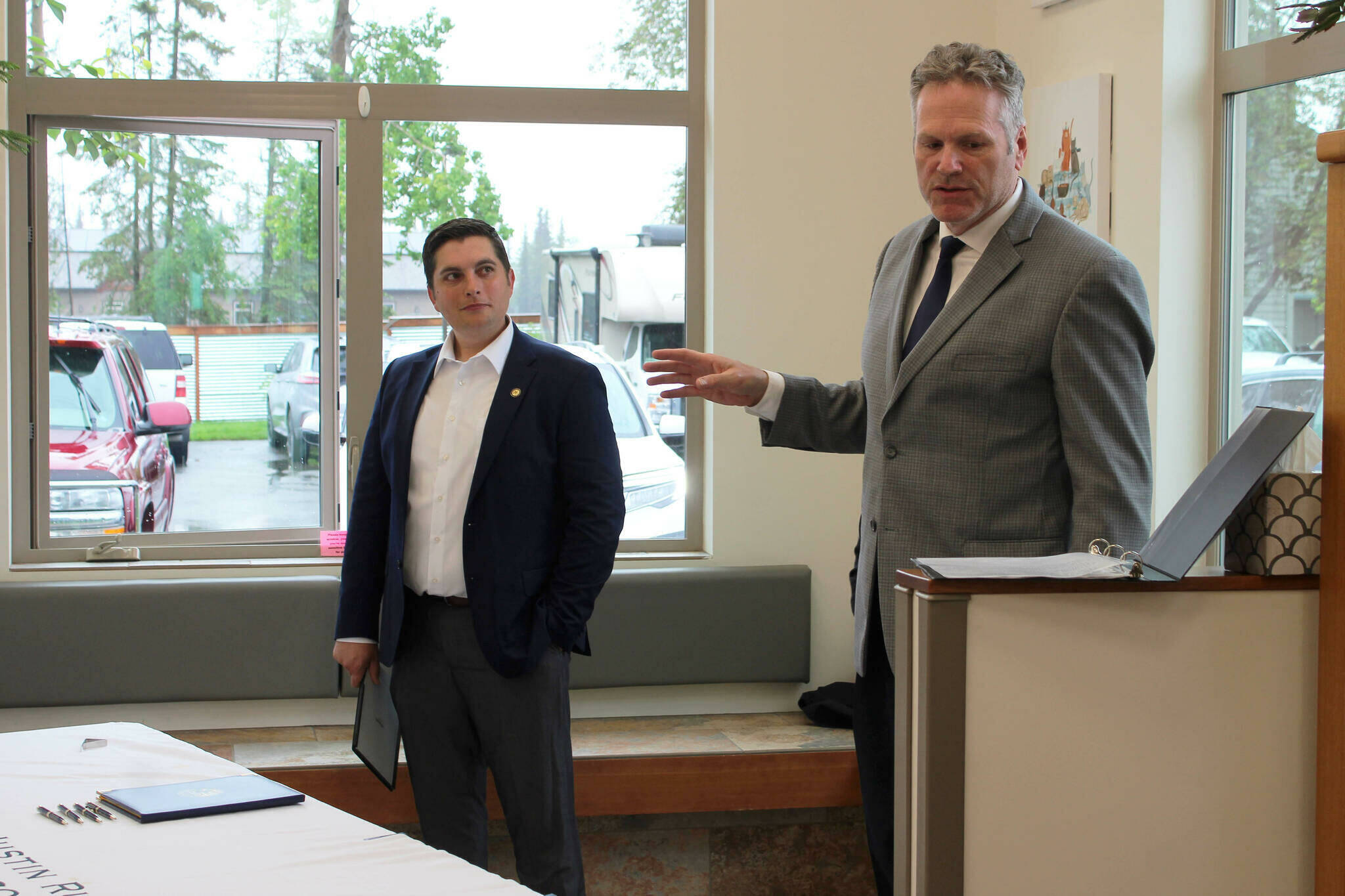Amid the throng of furry friends filing in and out of Twin Cities Veterinary Clinic on Thursday morning were the governor of Alaska, a state lawmaker and pharmacy leaders, all gathering to mark the signing of two state bills into law.
Both bills, sponsored by Rep. Justin Ruffridge, R-Soldotna, address pharmacy in Alaska. Ruffridge co-owns Soldotna Professional Pharmacy and is the former chair of the Alaska Board of Pharmacy.
The first bill signed, House Bill 56, exempts Alaska veterinarians from having to participate in the state’s prescription drug monitoring program, or PDMP.
That program monitors the prescription of Schedule II-IV controlled substances and is meant to reduce the misuse and abuse of controlled substances. Since 2017, Alaska’s health care providers, including veterinarians, have been required to report to the program.
In sponsoring the bill, Ruffridge said he sought to bolster patient privacy by recognizing that the system wasn’t designed for veterinarians and that less than 0.3% of all opioid prescriptions come from veterinarians. For example, Alaska’s PDMP allows veterinarians, while treating an animal, to see whether a pet’s owner has ever been prescribed a controlled substance.
“When you come to the vet clinic, you expect that your information is going to be safe,” Ruffridge told attendees Thursday. “In addition to that, veterinarians have for years said that this is a process that’s difficult for us to use and it doesn’t really lead to any sort of meaningful results as far as stopping bad users of opioids from getting access to medication that they shouldn’t.”
As it moved through the Alaska Legislature, H.B. 56 picked up 28 co-sponsors in the House of Representatives and 11 co-sponsors in the Senate. It was amended in committee to expand the ways veterinarians can become licensed to practice in Alaska, and crossed the legislative finish line with nearly unanimous support.
Dunleavy on Thursday said that he was honored to be at the signing ceremony and that the legislation addresses gaps in how the state is responding to the opioid crisis.
“Sometimes when you put bills together and you’re trying to combat an issue like the opiate epidemic, you have to go back and clean some things up because there’s unintended consequences,” Dunleavy said. “… The goal with the Legislature and myself is to just try and help people. When we see there’s a problem, we’re going to try and fix it.”
The other bill signed by Dunleavy at Twin Cities Veterinary Clinic was H.B. 112, which covers a wide range of issues relating to the field of pharmacy in Alaska and which Ruffridge described as being “in (his) wheelhouse.”
The bill requires one of the seven members of the Alaska Board of Pharmacy to be a pharmacy technician licensed in Alaska and authorizes that board to license and regulate entities that manufacture or distribute drugs. The bill also says the board can license internet-based pharmacies and says businesses may not call themselves an “apothecary” if they do not employ a licensed pharmacist.
The bill also newly allows Alaska’s pharmacists to administer epinephrine to patients. Epinephrine, often dispensed in the event of severe allergic reactions as an EpiPen, treats anaphylaxis. Under H.B. 112, pharmacists can both administer epinephrine to patients and prescribe epinephrine auto-injectors to people who have completed a training program approved by the Alaska Board of Pharmacy.
Generally, Ruffridge described the scope of H.B. 112 as being the culmination of recommendations from the Alaska Board of Pharmacy and the Alaska Pharmacists Association that help modernize state law.
“There is a sense that pharmacy is changing and we need to have our statutes and regulations updated in order to match that changing profession,” Ruffridge said Thursday. “This bill does a lot of that. … It was a great project to go through those regulations to update them and find out the things that needed to be altered or updated.”
More information on both bills can be found on the Alaska Legislature website at akleg.gov.
• Contact reporter Ashlyn O’Hara at ashlyn.ohara@peninsulaclarion.com.

